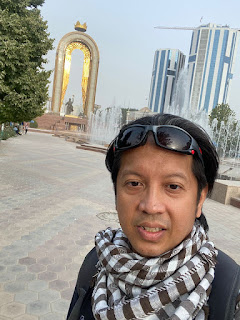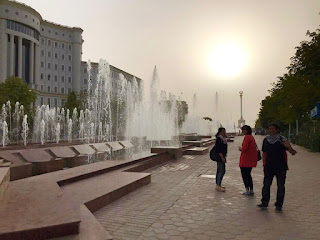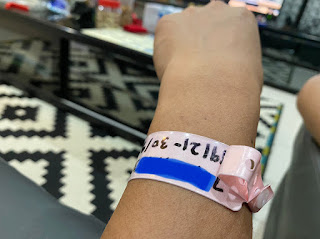journals of life , marriage , hope and aspiration.A happy go lucky anaesthetist working in a complicated and haphazard world. Enjoying his life no matter what !!!! SEMPOERNAKAN HARIMU
Wednesday, September 29, 2021
My first experience kot on Business Class
Stranded in Dushanbe
Back home and HSO14
Why 400k in private ICUs for Covid 19. Thats the realistic cost.
We, the doctors, nurses, pharmacists, physiotherapists, radiographers, and many other allied health care colleagues together with our management teams have been working hand in hand with our public sector colleagues in battling the Covid-19 pandemic. And yet, the spotlight often times is not on the work that is put in but the economics of it all which is poorly understood by many.
Malaysians were shocked by the revelation that the cost of ICU care in the private hospital for Covid-19 patients amounting to RM400,000 which to us is not surprising at all. This is the truth whenever we take into account the ICU support and services, medication costs, disposable personal protective equipment used (imagine a team of at least 6 doctors and nurses changing twice into Tyvek suits just to do their daily rounds for a month for a seriously ill Category 5). These patients are at the extremes of their multiorgan failure and will need all kinds of expensive medications and organ support like haemodialysis, mechanical ventilation, tracheostomy, and Extracorporeal membrane oxygenation in some cases (ECMO), serial diagnostic imaging and the usage of continuous drug therapies on top of the multiple human resource for an average ICU stay of at least 10 days with some even requiring weeks to months before being discharged home. The only way to make the cost lower is not to initiate any of the therapy as outlined above, which is completely unthinkable and presents an ethical dilemma. As such, we take the approach of do first while at the same time inform the family about the cost implications as it comes.
If one refers to the cost incurred in developed hospital countries it would amount to a similar number. To simply assume that the RM 400,000 as taking advantage in making profit from the situation is totally absurd. Please understand that in healthcare economics, the revenue that is obtained by the private hospitals charging the patient does not equate to high profit as there will be expenditures that need to be calculated against which, at times we may even have to write off some bills as bad debts.
What the public may not realize or choose not to understand is the cost that the government spends for each patient that is admitted to ICU. The government would in principle subsidize if not absorb all cost of ICU care. This can be clearly seen in recent MOH efforts in their official patient bill which will show how much the real total cost of care is.
In 2020, we were not faced with these financial dilemmas as the instructions were clear that all Covid-19 patients were to be managed in public hospitals while the private hospitals can continue to focus on care for the non- Covid 19 patients which were also being compromised. However, during the Covid 19 peak surge that occurred in 2021, there were not enough ICU beds for ill Covid-19 patients in the 140 government hospitals. For the writer to allude that the patients had a choice is irresponsible. Both the patients and the hospitals had no choice at times but to we have to manage them as they came as there were simply nowhere else to go other than the option of languishing in an Emergency Department chair of a public hospital for a day or two before a bed is secured. It was that bad.
We welcome any initiatives as suggested by YB Khairy Jamaluddin in Parliament that the government is studying ways to help the family with these bills. It was a crisis that the MOH had to act upon and if the government can use some of the taxpayer’s money towards this, it would be beneficial as the other way to look at is that the patients only ended in a private hospital ICU because there were no ICU beds available elsewhere. This, despite the fact that over a two-year period, almost half a billion ringgit was spent to increase the capacity and the number of ICU facilities to cater for the Covid 19 patients with the total ICU beds now double the number of ICU beds we had in 2019. It was a crisis that the author of the article chose to ignore.
When the Emergency Ordinance was announced, there was a possibility that private hospitals may potentially be taken over by the Government under Section 3 of the Act. The only drawback to this was who will fund the private hospitals for all costs incurred as the sustainability of these centres is upon the payment of the services which is provided. There are no taxpayers money involved here. These facilities also pay their corporate taxes to the government as well so by taking over, you’re effectively shutting out one revenue stream to the government. If these healthcare facilities are taken over without proper planning of their cash flow and reserves, Malaysia will end up with these hospitals closed or bankrupt thus further burdening the public health system where everyone will flock to the public hospitals and leading to a collapse of the entire healthcare system.
What the Covid-19 pandemic has exposed is how expensive healthcare can be and the current system we have may not be suitable for the government to sustain anymore. This is the hard truth, and politicians from both sides of the divide are well aware of this. They have chosen to sidestep the issue for far too long instead of trying to find meaningful ways to engage with the stakeholders and come up with a long-term solution. As some of these decisions are politically unpopular, the punches are then directed to the people who are actually sweating it out in the PPEs in trying to make a difference and saving the patients’ lives. The politicians do not see the mental impact that the Covid -19 pandemic has had on the private healthcare sector as well. We too go home with a heavy heart as well every time we lose a patient, no different from our public sector colleagues just because its private healthcare.
Whether we like it or not, running a private hospital is a business, and like any business’s profitability must be taken into consideration to guarantee the sustainability and continuity of such business. Issues such as the return of investment, upgrading and investing in newer technology and staff training is factored in to. This is all done to ensure patients get the best of the best. The cost in government hospital is actually nearly the same as that in private hospitals or slightly lower as the public hospitals buys in large numbers and bulk allowing some discounts in consumables but in general the cost is about the same. But such “cost saving” may actually be lost when we look in detail at how such items are actually being used in a clinical setting.
Most if not all those who work in private hospitals knows and understands the issue of cost. It is ingrain in our psyche’. The cost to the patient and to the hospital is taken into account at every step of the patient’s treatment. From the moment of admission right up to discharge and post discharge care and follow up. We do what is needed and indicated in achieving the best possible outcome in patient care and treatment. The care and treatment given is not compromised or substandard.
We would like to end this letter by saying that post pandemic, we can’t go back to business as usual. The public need to understand that healthcare is an investment, and the burden of the financial cost will need to be shared by all in order to make it sustainable. The government has done its part thus far, but it can be better. We need the political will to institute meaningful reforms involving both public and private sectors to continue to make the healthcare system in Malaysia the envy of even the most advanced developed countries in the world. Let’s not wait for the next big healthcare crisis to hit us before we make those necessary reforms. We now have a new Health Minister and judging by his first few weeks in office, we remain optimistic that things may change for the better under his watch.
Dr Mafeitzeral Mamat,
Dr Gunalan Palari Arumugam,
Dr Syed Rozaidi Wafa,
Dr Shahridan Fathil
Consultant Anaesthesiologists in Private Practice




























